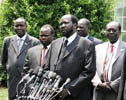
This Monday, the two main parties in Sudan arrived at a breakthrough in negotiations necessary for moving forward on key components of the North-South peace agreement signed in 2005. The ruling National Congress Party, or NCP, and its southern counterpart, the Southern People’s Liberation Movement, agreed on legislation whose provisions will govern how three crucial votes—a referendum for South Sudan’s independence set for 2011, popular consultations for areas in the North-South border region, as well as a vote in Abyei to determine whether it will join the North or the South—will be carried out.
This agreement is an essential step in the push for peace in Sudan, but is only one step out of many more to come. Following a parliamentary vote on these agreements set to occur this week, the two parties will have to continue to cooperate on actual implementation of what they have (only) on paper and in words, promised. Very few details (besides the agreement that a 51% majority and a 60% turnout will validate the South’s referendum) on the deal have emerged, but some actions will quickly have to take place, including appointments to the Southern and Abyei Referendum Commissions.
However, Sudanese history shows that the two parties’ agreement on paper may mean very little in practice, and that backsliding from either party may quickly occur. Given the eleventh-hour nature of the compromise, the agreement may simply be an act of brinksmanship on the part of the NCP—of waiting just before a conflagration breaks out to concede, then quickly going back on its word.
A case in point: the NCP’s show of good will Sunday night was quickly followed by a crackdown of political opposition Monday morning. The regime’s use of tear-gas and arrest of almost 50 protestors demonstrate that the environment of political intimidation will not be going away any time soon. Notably, the NCP is still not budging on reforms to the National Security Law, which in its current form allows for arbitrary arrests and detention. As long as the central government retains these and other extraordinary powers, the center v. periphery dynamic at the root of so much conflict in Sudan will undoubtedly remain. If the NCP is allowed to steal the elections next April, as looks more and more likely, this dynamic will become even more firmly entrenched.
But, there is also room for optimism and action. The international community can and should seize this opportunity to hold the two parties to what they have promised, enacting consequences at the first sign of equivocation. As Sudan inches closer to fulfilling these hallmarks of the peace process, the full weight of international pressures and vigilance is more crucial than ever.
Photo: South Sudanese President Salva Kiir with officials from the Government of South Sudan.

